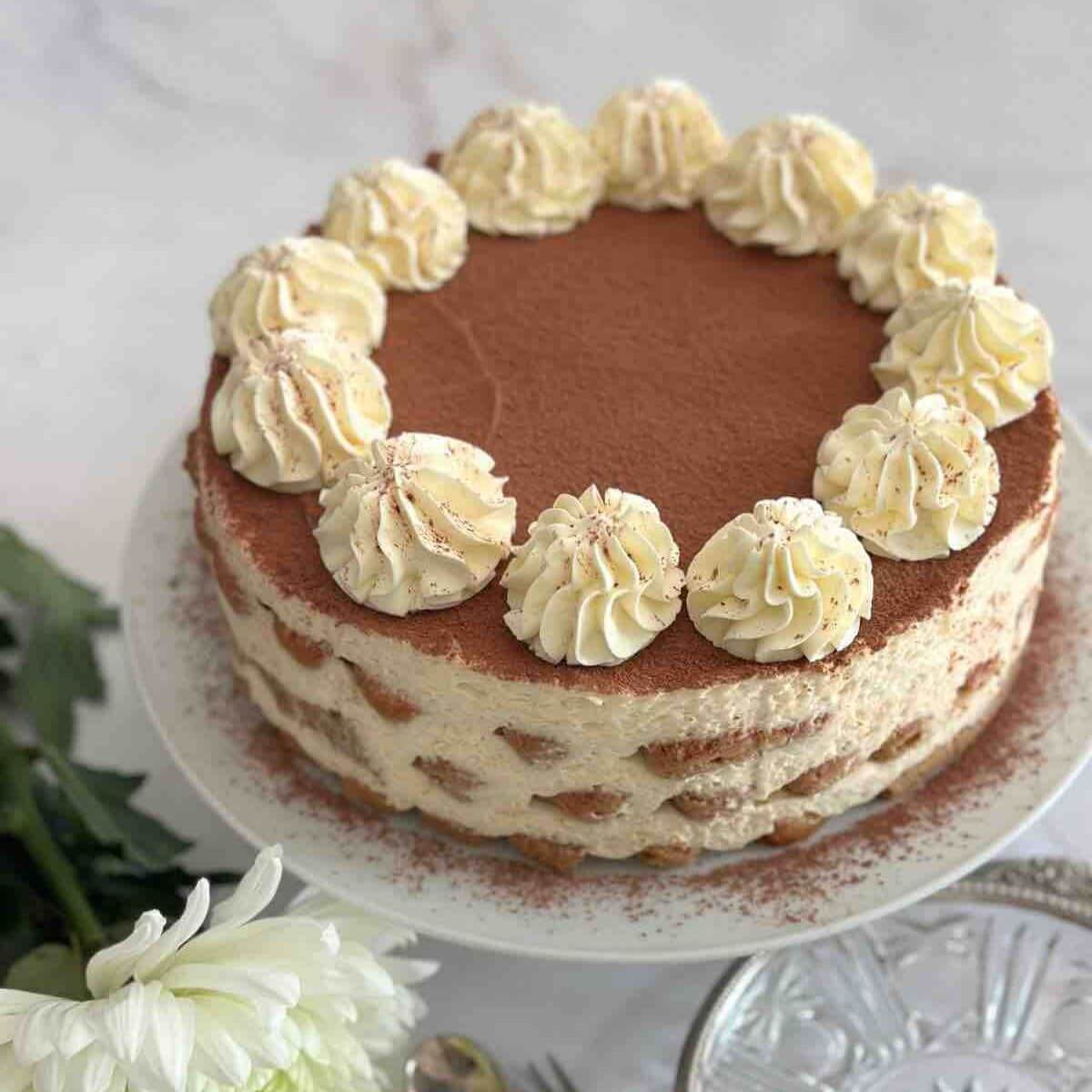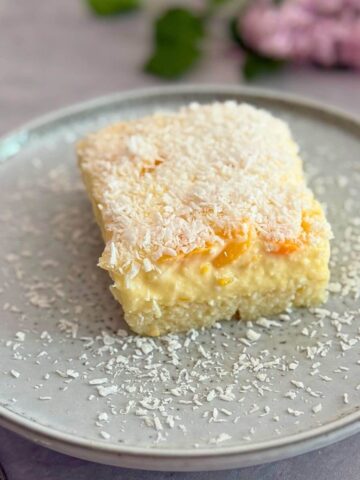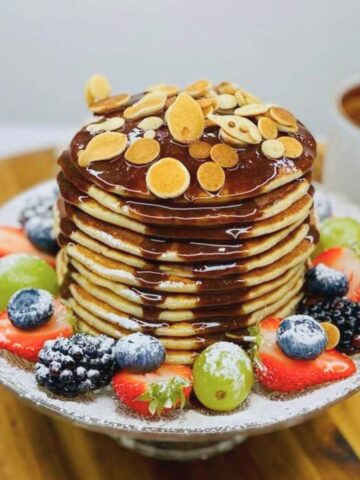This easy lemon layer cake with cream cheese frosting delivers moist lemon sponge layers paired with homemade lemon curd filling – no fancy skills needed! Perfect for beginner bakers wanting impressive desserts, it's a make-ahead party cake that stays fresh for days. The tangy cream cheese lemon glaze adds the perfect finish to this citrus dessert for special occasions.

🍋 Serves 12 | 🎂 Layer Cake | 🌱 Vegetarian | ⏱ 1.5 Hours
Time for another layer cake! If you’re a lemon dessert lover like I am, meet our crowning glory: a three-layer lemon drizzle cake with cheese frosting and lemon curd. If you're looking for other delicious options, try this dark chocolate orange cake topped with orange buttercream, rich chocolate berry mousse cake for chocolate lovers, or this moist apple cake with Nutella and whipped cream. Don’t forget about my layered tiramisu cake with coffee and cocoa—each one is sure to impress!
Made entirely from scratch using real lemons, this three-layer lemon cake is delightfully moist and light. Its exceptional taste is beautifully complemented by the tangy cream cheese buttercream.
Jump to:
💗 Why this recipe works
✔ Foolproof texture: Oil + butter combo keeps cake moist 3+ days
✔ Bright lemon flavor: Zest + juice in every component (sponge, curd, frosting)
✔ Stable frosting: Cream cheese ratio prevents sagging
✔ No buttermilk hack: Uses regular milk + extra lemon for tang
Perfect for: Easter | Mother’s Day | Summer BBQs - just like this simple vanilla peach dessert.
🎂 Lemon Layered Cake Ingredients
For the Lemon Sponge
- Self-rising flour – No need to measure baking powder separately
- Golden caster sugar – Finer grain dissolves better (sub: granulated)
- Lemon zest – Use organic/unsprayed lemons
For the Frosting
- Full-fat cream cheese – Low-fat versions make runny frosting
- Powdered sugar – Sifted to avoid lumps
For the Lemon Curd
- Fresh lemon juice – Bottled lacks brightness
- Eggs – Cooked gently to avoid scrambling
♻️ Substitutions
- Butter: Margarine, coconut oil, or a plant-based butter substitute for a vegan option.
- Golden Caster Sugar: Regular granulated sugar or light brown sugar.
- Self-Rising Flour: All-purpose flour with baking powder and salt. For 1 cup of self-rising flour, use 1 cup of all-purpose flour, 1.5 teaspoons of baking powder, and a pinch of salt.
- Baking Powder: Baking soda. Use ¼ teaspoon of baking soda for every 1 teaspoon of baking powder, and add a bit of acid (such as lemon juice or vinegar) to activate it.
- Eggs: Unsweetened applesauce, mashed bananas, yoghurt, or commercial egg replacers for a vegan option. For each egg, use ¼ cup of the substitute.
- Lemons: Lemon juice or lemon extract. Adjust the quantity to taste.
- Milk: Almond milk, soy milk, coconut milk, or any other non-dairy milk for a dairy-free option.
- Cream Cheese: Vegan cream cheese or cashew-based cream cheese for a dairy-free or vegan option.
- Unsalted Butter: Salted butter (reduce additional salt in the recipe accordingly), margarine, or a plant-based butter substitute for a vegan option.
- Vanilla Extract: Vanilla bean paste or almond extract.
- Powdered Sugar: Make your own by blending granulated sugar until fine. For a healthier alternative, you can use powdered coconut sugar.
- Edible Flowers: Fresh berries, mint leaves, or any edible decorations of your choice.

♻️ Easy Dietary Swaps
- Gluten-free: Use GF self-rising flour blend
- Dairy-free: Vegan butter + coconut cream cheese
- Egg-free: ¼ cup applesauce per egg
📋 Variations
- Lemon Blueberry Bundt Cake: Fold 1 cup fresh blueberries into the batter for juicy bursts. Tip: Toss berries in flour first to prevent sinking.
- Lemon Poppy Seed Loaf Cake: Add 2 tablespoon poppy seeds + 1 teaspoon vanilla for a classic bakery texture. Perfect with tea!
- Tropical Lemon Coconut Cake: Mix in ½ cup toasted coconut flakes + 1 tablespoon coconut extract for island vibes.
- Lemon Raspberry Layer Cake: Swirl ½ cup raspberry jam through batter for pretty marbling. Pair with cream cheese frosting.
- Lemon Almond Pound Cake: Replace ⅓ cup flour with almond flour + ½ teaspoon almond extract for nutty richness.
Pro Decorating Tips
- Naked cake style: Frost thinly to show layers
- Edible flowers: Pansies or violets add elegance
- Lemon slices: Candy them for garnish

❓FAQS
Cream cheese frosting is always a solid choice—it works great with lemon! You can mix in a little honey or ginger for something a bit different. Fruit-based frostings like blueberry, strawberry, or blackberry also taste amazing with lemon cake.
Cream cheese frosting is super versatile—it works with so many cakes! I love it on carrot cake, banana cake, red velvet, pumpkin cake, and spice cake. It’s smooth, creamy, and easy to spread, which makes it a go-to in my kitchen.
This cake stays fresh and moist for up to 3 days when stored properly:
Assembled cake: Cover loosely and refrigerate (the frosting and curd need refrigeration)
Unfrosted layers: Wrap tightly in plastic and freeze for up to 2 months – thaw at room temp before frosting
Lemon curd: Store separately in an airtight container for 1 week in the fridge
Pro Tip: For maximum freshness, press plastic wrap directly onto cut cake slices to prevent drying.
You Might Also Like ...
Tried this recipe? Give it a star rating below! ⭐⭐⭐⭐⭐
HUNGRY FOR MORE? Subscribe to my newsletter and follow along on Facebook, Pinterest, and Instagram for the latest updates.










Claudia Ciorteanu says
My family loved this!
Ashley says
I heard about Lemon Drizzle cake on the Great British Baking Show and always wanted to make it. Wow! What a fantastic recipe--this one's a keeper for sure!
Jacqueline Debono says
We have a ton of lemons on our tree this year and I've been looking for ways to use them. I love lemon flavoured cakes and this is one of the best recipes I have tried!
Sonja says
Such a pretty cake! Love the edible flowers on top. This was so easy to make, despite the layers, that I usually shy away from. My guests pretty much inhaled it.
Gloria says
I love lemon desserts. This cake is right up my alley. Perfect for BBQ parties this summer.
Liz says
SO delicious! I can never resist cream cheese frosting and the lemon curd pushed this yummy cake over the top!!
Stephanie says
This is one of those desserts that everyone enjoys. It's light, lemony and delish!
Medeea says
Lemon cake is the perfect treat for a sunny day! Totally recommend!
Medeea says
Lemon cake is the perfect treat for a sunny day! Its tangy and refreshing flavour, coupled with the moist, fluffy texture, makes it a delightful indulgence for any occasion. Totally recommend!
Razvan says
Delicious and fresh dessert! ❤️